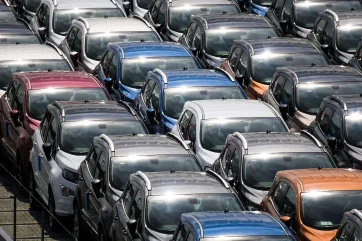
The UK new car market recorded growth in 2024, both in overall registrations and those of EVs, thanks mainly to fleets, the Society of Motor Manufacturers and Traders (SMMT) has said.
Year-on-year, SMMT figures show overall registrations rose by 2.6% in 2024, with 1,952,778 new cars registered.
This included an 11.8% increase in fleet registrations, which stood in contrast to an 8.7% fall in private registrations, and a 3.1% fall in business registrations, classed as those to organisations with fewer than 25 vehicles.
Fleets took a 59.6% market share in 2024, ahead of the private market with 38.2%, and the business market with 2.2%.
As for EVs, these took 19.6% of the overall market in 2024, up by 21.4% year-on-year – although the SMMT pointed out this was still down on the 22% required of manufacturers by the UK Government’s ZEV mandate.
Again, fleets took much of the credit for this, with 25.4% of fleet and business registrations being EVs, compared with only one in 10 private registrations.
As for other fuel types, plug-in hybrids were up by 18.3% year-on-year overall, taking an 8.6% market share, and conventional hybrids were up by 9.6%, for a 13.4% market share.
Petrol car registrations were down by 4.4%, though still took a 52.2% market share, while diesels were down by 13.6%, for a 6.3% market share.
SMMT chief executive Mike Hawes said: “A record year for EV registrations underscores vehicle manufacturers’ unswerving commitment to a decarbonised new car market, with more choice, better range and increased affordability than ever before.
“This has come at huge cost, however, with the billions invested in new models being supplemented by generous incentives which are unsustainable.
“We need rapid results from the regulatory review and urgent substantive support for consumers – else automotive investments will be at risk and the jobs, economic growth and net zero ambitions we all share in jeopardy.”
Reacting to the figures, Lex Autolease managing director Nick Williams said: “Manufacturers have seen significant growth in electric vehicle sales over the course of 2024, with recovery from supply chain disruptions and more competitive pricing helping to boost purchases.
“While challenges persist, there is a quiet confidence that 2025 will see the sector successfully continue to help the country in its transition to a more sustainable future.
“Carmakers know they need to continue to invest in electric vehicles to attract consumers, which is important to the industry’s future success as the shift towards electrification continues to accelerate.
“A raft of new models coming to market and the continued growth of the second-hand market will help, but so too will investment in nascent technologies and the country’s charging infrastructure.”
The SMMT has also published monthly figures for December, which saw overall registrations down by 0.2% year-on-year, although this included a 0.2% rise in fleet registrations, alongside a 1.7% decline in private registrations and a 9.6% rise in business registrations.
EV registrations were up by 56.8% year-on-year in December, taking 31% of the overall market, while plug-in hybrids were up by 4.6%, conventional hybrids up by 10.4%, petrols down by 20.9%, and diesels down by 27.4%.
Novuna Vehicle Solutions managing director Jon Lawes said: “An uptick in EV growth in December reflects the significant discounting by manufacturers to reach EV vehicle quotas. However, it remains clear that such incentives are unsustainable with the ZEV mandate unfit for purpose, and the challenges will only get worse with rising thresholds this year.
“There’s no doubt that the industry widely maintains support for the transition, but the government must act now to relieve pressure on manufacturers that are already stretched to hit overly ambitious targets by providing bold fiscal support over and beyond measures just for company car drivers.
“Any misalignments with the 2030 ICE phase-out timeline must also be ironed out urgently with a swift conclusion to the consultation – the status quo threatens to stifle the transition to zero emissions vehicles in the year ahead.”





